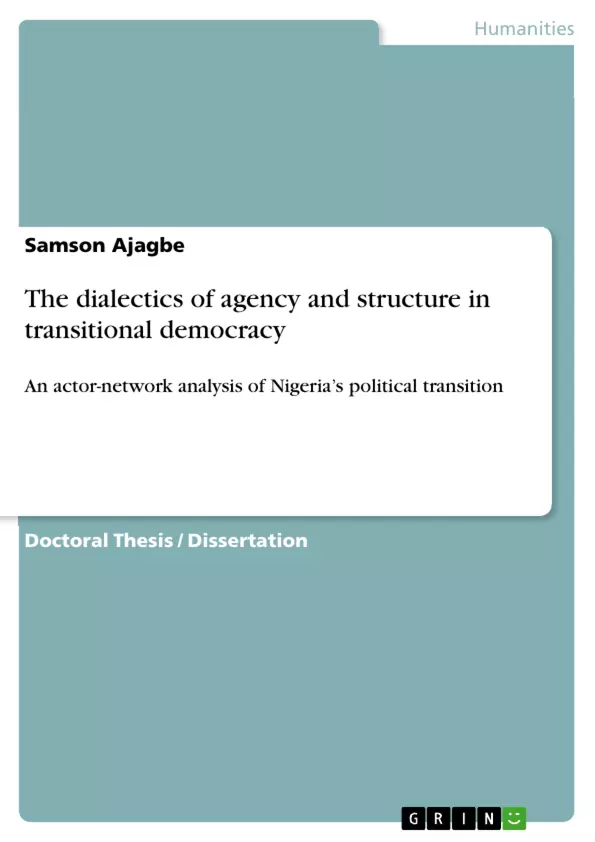This thesis argues that we can no longer ignore elite’s enrolment of institutions in rendering what they do intelligible as political outcomes in our understanding of African politics. The complex interdependency between elites and institution inheres into politics in ways political practices and actions are fabricated as permissible in the state of affair. This interaction is best understood through Actor-Network Theory (ANT) which essentializes hybridization in its conceptualization of the world. In this network thinking, transitional elites align and advance their interests through translating and enrolling institutions in the process of democratization.
The analysis draws from Nigeria’s democratization experience to bring together the institutional components of the state and leadership, i.e. elites, which have been mostly analyzed as separate entities in the study of democratization. The actor-network theory is used both as a conceptual frame and as a method for analyzing democratization as an outcome of the content of the two main societal forces— elite and institution. The actor-network theory’s, developed by Michel Callon and Bruno Latour, and their collaborators, flat ontology provides a way to bypass agency/structure dichotomy to inscribe network thinking in relations of democratization in Africa. The actor-network was originally theorized by Focault but not nurtured and, therefore, muted in his governmentality study.
In this view, this thesis builds on the explanatory potentials of network analysis that enable a socio-technical account of political transition with all those particularities, contradictions and surprising turn of events. The “old-guard autocrats” in politics in Nigeria is used as the human element of the network. The non-human element is operationalized through the institutionalized power sharing norm and political patronage relationships. The analysis thus recognizes the interaction between the human (elites) and the non-human (institution) as actors that define adaptive and emergent characters of democratization.
Inhaltsverzeichnis (Table of Contents)
- Introduction
- Working Hypothesis
- Obligatory Passage Point (OPP): The "Old Guard Autocrats"
- Chapters Organization
- References
- Literature Review
- The Classical Democracy Terminology
- Contemporary Democracy Conceptualization
- Approaches to Democracy
- Structural Approach
- Contingent Approach
- International Approach
- The Paradox of Post-Cold War Democratization in Africa
- Conclusion
- References
- Theoretical Consideration
- Actor Network Theory (ANT)
- References
- Methodology
- Introduction
- The Epistemological and Ontological Aspects
- Paradigm of Inquiry: The Rationale for Actor-Network Analysis and Qualitative Inquiry
- The Process of Conducting the Study
- Research Question and Assumption
- The "Old-Guard Autocrats" in Politics
- Plan and Instrumentation
- Commencement and Initial Problems
- Theoretical Classifications
- Cognitive
- Political and Cultural Circumstances
- Assessing Data
- Conclusion
- References
- The Interpretation of Actors in the "spaces of negotiation": Interessement, Enrollment and Inscription
- The Human Element: Interessement and Enrollment
- The Politics of Affect and the Influx of Retired Military Officers in Politics
- Affective Reaction as Enrollment: the Acceptance of Interest as Focal Actor
- Enrolling the Non-Human Element: Institutions as Actor
- Institutional Arrangements: the Subject, Object and Informal Institutions
- Conclusion
- References
Zielsetzung und Themenschwerpunkte (Objectives and Key Themes)
This dissertation aims to analyze the political transition in Nigeria through the lens of Actor-Network Theory (ANT). It explores the complex interplay of agency and structure in a transitional democracy, focusing on the role of "old guard autocrats" in shaping political processes.
- The interplay of agency and structure in shaping political outcomes in a transitional democracy
- The role of "old guard autocrats" in influencing political transitions
- The application of Actor-Network Theory (ANT) to understand political dynamics in Nigeria
- The importance of considering both human and non-human actors in analyzing political processes
- The influence of institutions and informal networks in shaping political transitions
Zusammenfassung der Kapitel (Chapter Summaries)
The introduction provides a working hypothesis and outlines the dissertation's organization. The literature review explores classical and contemporary democracy terminology, examines various approaches to democracy, and discusses the paradox of post-Cold War democratization in Africa. The theoretical consideration chapter introduces Actor-Network Theory (ANT) as the framework for the study. The methodology chapter details the research process, including the epistemological and ontological aspects, the rationale for using ANT and qualitative inquiry, the research question and assumptions, and the plan and instrumentation of the study. The final chapter, focusing on the interpretation of actors in "spaces of negotiation," delves into the concepts of interessement, enrollment, and inscription, examining both human and non-human elements in the political process.
Schlüsselwörter (Keywords)
The core concepts and keywords of this dissertation include transitional democracy, agency, structure, Actor-Network Theory (ANT), old guard autocrats, Nigeria, political transition, human and non-human actors, institutions, informal networks, interessement, enrollment, and inscription.
Frequently Asked Questions
What is the focus of the thesis on transitional democracy in Nigeria?
The thesis analyzes the complex interplay between political elites ("old guard autocrats") and institutions using Actor-Network Theory (ANT).
How is Actor-Network Theory (ANT) applied to politics?
ANT is used to bypass the traditional agency/structure dichotomy, treating both humans (elites) and non-humans (institutions/norms) as actors in a network.
Who are the "old guard autocrats" mentioned in the study?
They represent the human element of the political network in Nigeria, specifically retired military officers and established elites influencing democratization.
What are the "non-human" elements in this political network?
Non-human actors include institutionalized power-sharing norms, political patronage relationships, and formal/informal rules of the state.
What is the significance of "enrollment" in ANT?
Enrollment refers to the process by which focal actors align the interests of other actors (human and institutional) to achieve specific political outcomes.
- Arbeit zitieren
- Samson Ajagbe (Autor:in), 2015, The dialectics of agency and structure in transitional democracy, München, GRIN Verlag, https://www.grin.com/document/301526



